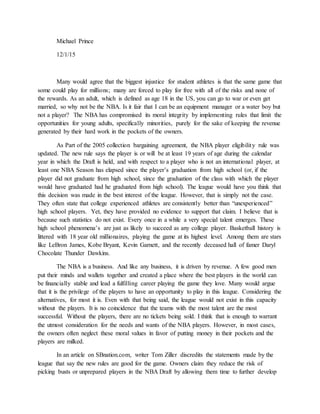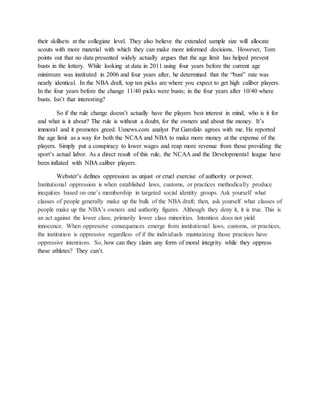One And Done
- 1. Michael Prince 12/1/15 Many would agree that the biggest injustice for student athletes is that the same game that some could play for millions; many are forced to play for free with all of the risks and none of the rewards. As an adult, which is defined as age 18 in the US, you can go to war or even get married, so why not be the NBA. Is it fair that I can be an equipment manager or a water boy but not a player? The NBA has compromised its moral integrity by implementing rules that limit the opportunities for young adults, specifically minorities, purely for the sake of keeping the revenue generated by their hard work in the pockets of the owners. As Part of the 2005 collection bargaining agreement, the NBA player eligibility rule was updated. The new rule says the player is or will be at least 19 years of age during the calendar year in which the Draft is held, and with respect to a player who is not an international player, at least one NBA Season has elapsed since the playerâs graduation from high school (or, if the player did not graduate from high school, since the graduation of the class with which the player would have graduated had he graduated from high school). The league would have you think that this decision was made in the best interest of the league. However, that is simply not the case. They often state that college experienced athletes are consistently better than âunexperiencedâ high school players. Yet, they have provided no evidence to support that claim. I believe that is because such statistics do not exist. Every once in a while a very special talent emerges. These high school phenomenaâs are just as likely to succeed as any college player. Basketball history is littered with 18 year old millionaires, playing the game at its highest level. Among them are stars like LeBron James, Kobe Bryant, Kevin Garnett, and the recently deceased hall of famer Daryl Chocolate Thunder Dawkins. The NBA is a business. And like any business, it is driven by revenue. A few good men put their minds and wallets together and created a place where the best players in the world can be financially stable and lead a fulfilling career playing the game they love. Many would argue that it is the privilege of the players to have an opportunity to play in this league. Considering the alternatives, for most it is. Even with that being said, the league would not exist in this capacity without the players. It is no coincidence that the teams with the most talent are the most successful. Without the players, there are no tickets being sold. I think that is enough to warrant the utmost consideration for the needs and wants of the NBA players. However, in most cases, the owners often neglect these moral values in favor of putting money in their pockets and the players are milked. In an article on SBnation.com, writer Tom Ziller discredits the statements made by the league that say the new rules are good for the game. Owners claim they reduce the risk of picking busts or unprepared players in the NBA Draft by allowing them time to further develop
- 2. their skillsets at the collegiate level. They also believe the extended sample size will allocate scouts with more material with which they can make more informed decisions. However, Tom points out that no data presented widely actually argues that the age limit has helped prevent busts in the lottery. While looking at data in 2011 using four years before the current age minimum was instituted in 2006 and four years after, he determined that the âbustâ rate was nearly identical. In the NBA draft, top ten picks are where you expect to get high caliber players. In the four years before the change 11/40 picks were busts; in the four years after 10/40 where busts. Isnât that interesting? So if the rule change doesnât actually have the players best interest in mind, who is it for and what is it about? The rule is without a doubt, for the owners and about the money. Itâs immoral and it promotes greed. Usnews.com analyst Pat Garofalo agrees with me. He reported the age limit as a way for both the NCAA and NBA to make more money at the expense of the players. Simply put a conspiracy to lower wages and reap more revenue from those providing the sportâs actual labor. As a direct result of this rule, the NCAA and the Developmental league have been inflated with NBA caliber players. Websterâs defines oppression as unjust or cruel exercise of authority or power. Institutional oppression is when established laws, customs, or practices methodically produce inequities based on oneâs membership in targeted social identity groups. Ask yourself what classes of people generally make up the bulk of the NBA draft; then, ask yourself what classes of people make up the NBAâs owners and authority figures. Although they deny it, it is true. This is an act against the lower class; primarily lower class minorities. Intention does not yield innocence. When oppressive consequences emerge from institutional laws, customs, or practices, the institution is oppressive regardless of if the individuals maintaining those practices have oppressive intentions. So, how can they claim any form of moral integrity while they oppress these athletes? They canât.

